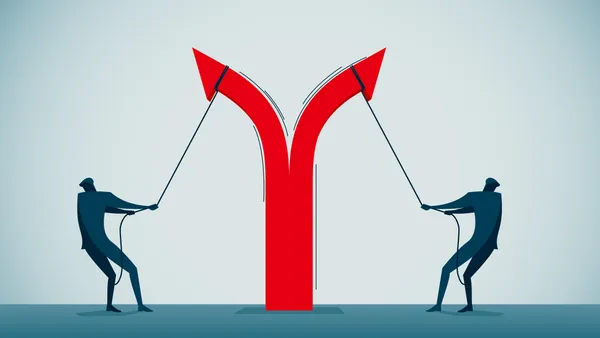You might never guess from the headlines, but deep down, the ethical attitudes of American businesspeople are improving, according to a new study by five Baylor University professors.
“Ethical Attitudes in Small Businesses and Large Corporations,” published recently in the Journal of Small Business Management, was based on a survey sent to 10,000 U.S. business professionals in 1985, 1993, and 2001. Participants were asked to judge “acceptable responses to 16 scenarios profiling common business situations with questionable ethical dimensions.” (Though adjusted for inflation, the scenarios were otherwise the same.)
One scenario concerned a company that paid a “consulting” fee to a foreign official who promised assistance with a very profitable contract. Another concerned a controller who selected a legal method of financial reporting that nonetheless concealed some embarrassing financial facts. Still another concerned an executive who promoted a loyal friend and competent manager at the expense of a better-qualified manager without such close ties.
The responses, compiled into a single “ethics index” for each survey year, show “a trend toward higher ethical standards,” according to the study. With the exception of the 1993 survey, researchers found no significant differences between the responses of participants at large companies (with more than 1,000 employees) and small companies (with fewer than 100).
Those are encouraging findings, says study co-author Joseph McKinney, because ethical attitudes are related to behavior. Ethical attitudes also foster a more efficient business environment, adds co-author Leslie Palich, who observes that “if you distrust those you are dealing with, you must monitor contracts more carefully, and the lack of trust drives transaction costs up.” (The study did not attempt to track ethical behavior itself, let alone transaction costs.)
The results surprised McKinney, who had observed after the 1985 survey that older individuals responded more ethically than the younger respondents. Was that difference due to the maturity of the respondents, he wondered, or to a moral decline? The 1993 and 2001 results, maintains McKinney, “cast considerable doubt on the moral decline possibility.”
Nell Minow might disagree. The co-founder of governance-research firm The Corporate Library, Minow doesn’t believe that corporate ethical behavior has improved. “Ken Lay once gave a speech about ethical attitudes,” she recalls. “His attitudes were fine; his behavior was a problem.”
“I have no doubt that corporate ethical behavior has improved,” counters former SEC chairman Harvey Pitt, now the chief executive of consultancy Kalorama Partners. He tempers that response, however, by focusing on improvements over the past few years, since the very public implosion of several large companies. “On that issue, I think we’ve seen a lot of improvement, but not nearly enough,” says Pitt.
It’s true, Palich acknowledges, that actions and not attitude are what really matter. Thoughts and deeds can be mismatched, he adds, and people who might otherwise do the right thing can be pressured to do something wrong. Palich believes, however, that there is a correlation between attitude and behavior.
It’s also possible, adds McKinney, “that ethical attitudes go through cycles, and we may be in a cycle that is more favorable now.” Keep watching those headlines.












